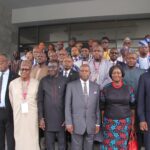North Central Development Commission Inaugurated,Set priorities amidst Heavys Burden of Reconstruction and Development
By Raymond Enoch
The recent creation of the North Central Development Commission (NCDC) by President Bola Ahmed Tinubu has reignited hope for millions across Benue, Nasarawa, Kwara, Kogi, Niger, Plateau, and the Federal Capital Territory (FCT)—a region long plagued by insecurity, poverty, and infrastructural decay. With its headquarters in Lafia, Nasarawa State, and a board now inaugurated, the commission has officially begun what could be one of the most consequential socio-economic turnaround missions in Nigeria’s modern history.

The North Central region, often referred to as Nigeria’s “Middle Belt,” has endured decades of economic stagnation, violent conflict, and environmental degradation. The establishment of the NCDC not only recognizes the depth of the challenges but sets the stage for a coordinated, regional response to a long list of systemic issues.
According to development data, over 75% of rural Nigerians live below the poverty line, with a significant portion residing in the North Central region. Inflation, insecurity, and an over-reliance on oil revenues have deepened this poverty, leaving millions living on less than $2.15 per day.
Beyond economic hardship, the region is ground zero for violent conflicts, including farmer-herder clashes, banditry, and attacks by local militias, particularly in Benue, Plateau, Niger, and parts of Kogi and Nasarawa. These conflicts have displaced tens of thousands, reduced access to farmland, and stalled agricultural productivity—an irony for a region once known as Nigeria’s food basket.

The NCDC’s foremost challenge is to help restore peace and safety across the zone. No sustainable development can take root in an environment of chaos. Therefore, a comprehensive regional security architecture must be devised—supporting existing agencies while fostering localized community protection networks. Collaboration with state governments, traditional leaders, and civil society is imperative to stem the tide of violence and restore stability.
From droughts and floods to deforestation and soil erosion, the region is under siege from the devastating effects of climate change. In states like Benue, Niger, and Plateau, competition over dwindling natural resources has only intensified social tensions. The NCDC must develop an environmental resilience strategy—including sustainable farming, reforestation projects, and climate-smart infrastructure to protect lives and livelihoods.
The humanitarian crisis in the North Central is vast and urgent. In just four states—Benue, Nasarawa, Niger, and Plateau—over 300,000 people have been displaced, many of whom are women and children in need of protection, trauma care, shelter, and livelihood support. The NCDC must collaborate with development partners, non-governmental organizations, and community leaders to create long-term solutions that go beyond short-term relief.
Large swaths of the region lack functional healthcare, education, and basic infrastructure. In many communities, schools and clinics have been destroyed or abandoned. The commission must prioritize the restoration of essential services, including the reconstruction of public institutions, the training of personnel, and the equipping of hospitals and schools.
Without transparency, coordination, and community participation, even the best plans can falter. The North Central has long suffered from weak governance, corruption, and resource mismanagement. The NCDC must distinguish itself through efficient project execution, accountability, and citizen engagement. This is the only way to rebuild trust and deliver real change.
The Road Ahead
With funds already earmarked in the 2025 Federal Budget, the North Central Development Commission is poised to hit the ground running. But its success will depend on its ability to coordinate across sectors, engage meaningfully with local stakeholders, and deliver tangible results.
The region’s challenges are deeply intertwined—economic stagnation fuels insecurity, which in turn hampers development and worsens poverty. A comprehensive, multi-sectoral approach is not just ideal—it is non-negotiable. The North Central can become a model for regional transformation in Nigeria, but only if the NCDC embraces its mandate with urgency, integrity, and innovation.
The task is enormous. But so too is the opportunity.









